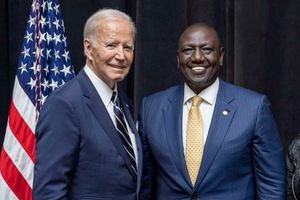
Deputy President Rigathi Gachagua during a past event.
I’m stripping off my clothes, changing into an old oversize shirt, an equally oversize trouser of indeterminate progeny, folded at the ankles, and I’m hitting the road shoeless: I’m going native.
Deputy President Rigathi Gachagua’s call for unity of the Mountain — I presume that includes us, people of the East — is most welcome.
His statement that no Kenyan should be victimised because of their political choices in 2022,when the Kenya Kwanza government was elected by 32 per cent of registered voters with a 200,000 landslide majority, is long overdue.
These statements are good. Spending quality time in Makandune over the past year and having listened carefully — very carefully — to my villagemates, I’m in a position to speak about the perspective of the ordinary people of lower Central Imenti in particular and the Greater Meru — from Mutuati to Nithi, from Kiamuri to Kimbo, from Gianchuku to Usueni and points between — in general.
First, Mr Gachagua has been a main and most vicious vilifier of people deemed unsupportive of his party.
He famously told the world that the government has shareholders; those who did not vote for Kenya Kwanza had no rights in Kenya, not even the right to work and earn an honest living. That was reserved for the pure ones — the Kenya Kwanza loyalists.
So there was a massacre of professional people, especially those who worked for the government: Competent, dedicated public servants who had given many years of their lives to serve the people of Kenya.
They had been properly interviewed and employed but were fired and their jobs given to members of 'shareholder' tribes, some who were not as competent.
Families that were comfortable were suddenly thrown into penury because man and wife were kicked out to make way for “shareholders”.
Date with destiny
Even in the private sector, a few ‘smart’ oligarchs offered ‘Azimio agents’ as burnt offerings to the new regime to marinate their way to deals.
Talking unity to the suffering victims of these purges is — to use an ugly exaggerated image — like Pol Pot preaching life to the bones of his victims.
The traditional surgeon was traditionally a respected — perhaps even feared — personage. He was not an ordinary man; he had “riri” (mystique) about him. During the season, when the surgeon had to operate on a line of boys a kilometre long, bending for hours would be brutal to the back.
But he could not just stand up and stretch his back like any ordinary man — because he was no ordinary man.
So, the crafty surgeon would suddenly and violently drive his shoulder into the stomach of an initiate, sending him flying into the dust.
The relatives of the poor boy, who would have been milling around with spears and drawn swords, would crowd the surgeon, intending to kill him for attacking a defenceless boy.
But the relatives of the long line of waiting boys would intervene to protect their sons’ date with destiny. As the two groups fought, the surgeon would stretch and rest his back, ready to attack the line when peace was restored.
A man does not bleat. Mr Gachagua is facing a line of tribulations a kilometre long between now and 2027. Whining will drain the remaining riri from him; he should make acquittance with the wisdom of resting his mouth.
In the old days, when a squad of young men met their mothers on the road, a dramatic spectacle was enacted. The mums would line up, turn as one and face the fence, their backs to their sons.
Genuinely contrite soul
The men, their eyes straight ahead, would silently file past. A young man never stared his mother in the face. To this day, if you are looking for trouble in the village, joke around with a man’s mother.
There are people in this discourse who are on record threatening Mama Ngina Kenyatta, the wife of Mzee Jomo Kenyatta, a man of great respect to many generations in these parts.
The same people who have bleaters in their offices who accused a lady Cabinet Secretary from these parts — a lady old enough to be mother and grandmother to many — of conspiring at Hotel La Mada to assassinate a politician.
This wonderful mother just cooked for her children and gave exemplary service to her country; she couldn’t conspire to kill a cat if her life depended on it.
Here in the village, many things are forgiven. A lack of manners is not a favourite.
Some other people still have the white fat of somebody’s sheep on their beard. This is called “ntembe”, and it is advisable to wash it off before going to ask for peace from the man whose animals you rustled.
The “good men” is suing for peace not out of the kindness of his heart but because somebody is holding his political backside to the fire. So, he is running back home for ointment.
Fortunately for him, among Africans, unless you have committed a crime that requires you to be stuffed in a beehive and rolled down a mountain, reconciliation is never ruled out for a genuinely contrite soul.
Mr Mathiu, a media consultant at Steward-Africa, is a former Editor-in-Chief of Nation Media Group. [email protected]










